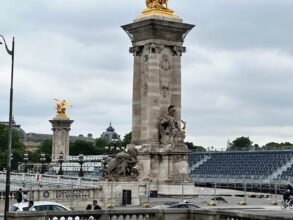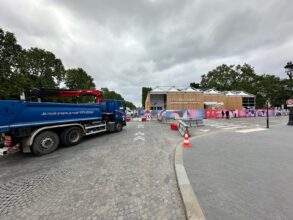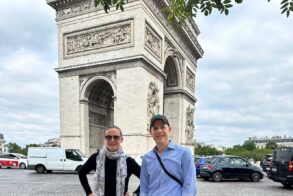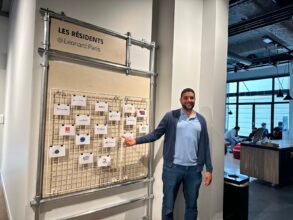
With only a month to go until the opening ceremonies, Paris is abuzz with preparations for the games. Speaking to people here, there is a palpable sense of agitation and also pride as they reference the ambition in this year’s games, although not for what they will build—but for what they won’t build.
One of the major goals for the organizers is to make this year’s Olympics a showplace for smart, sustainable development and, against the incredible backdrop of the City of Lights at its best, both big and small French companies are betting big on the opportunity to promote the ROI of climate tech.
Central Paris is a sea of scaffolding that looks more like Lollapalooza than a traditional Olympics
What is immediately striking about the Paris Olympics is how little actual permanent construction there is. In fact, there are only two new structures being built for the games (see our prior article, Five Olympic Venues Show How France is Meeting Its Ambitious Carbon Reduction Goals). Instead, central Paris is a sea of scaffolding that makes the event look more like Lollapalooza than a traditional Olympics, as organizers seek to capitalize on the reuse of existing buildings and the drama and beauty of the backdrop of the city center itself.
Behind the beauty and the excitement of the event lies one of the world’s most committed and developed environment-focused ecosystems with a government, industry, and startup community that is growing and increasingly learning to frame their offerings, not just in terms of climate action, but as smart business with financial benefits.
Beyond Reduce, Emphasizing Reuse and the Circular Economy

The sustainability efforts at the games highlight the impact on a wide swath of industries. Watching work proceed, one can see everything from extensive use of wood and temporary scaffolding (in lieu of permanent structures requiring more conventional concrete, steel, drywall and other products) to biofuel-powered trucks to extensive work on the city’s water infrastructure.
In theory, the structures being erected are more sustainable but also more economical and able to be disassembled and reused after the games. This concept of rehabilitation and reuse is particularly pronounced. Sometimes referred to as the “circular economy,” the idea encompasses a range of types of efforts that emphasize the value, not just of reducing or substituting energy and materials, but also thinking about undertaking projects with future uses in mind.
Altaroad: Leveraging AI For the Circular Economy

One example of a French startup leveraging technology for the circular economy is a firm called Altaroad that leverages reality capture and AI tech to automate the tracing of waste flows hauled from construction sites, helping companies optimize how they sort, salvage and recycle. In our preparations for this week’s BuiltWorlds Paris Summit, we had the opportunity to meet with Altaroad CEO and co-founder Cecile Villette and to learn more about the solution. The company has raised more than 4 million euros and boasts clients such as Vinci, Eiffage, and Groupe Fayat.
We had the opportunity to discuss the company’s plans for expansion beyond France, and Villette was quick to point out that with increased efficiency in the process of recycling, the rising costs of materials and fuel, and other factors, there is real return on investment for companies that implement state of the art recycling programs. She also explained how AI is helping to enable that efficiency.
Arsenio: Online Training For a More Efficient, Environmentally Friendly Industry

Visiting Vinci’s Leonard facility, we find a hive of activity. The building is a sort of campus center for a range of activities and groups including startups partnering with Vinci and startups grown from within Vinci.
One of those startups is Arsenio, a training platform and community for professionals in the design and construction industry interested in learning about best practices for leveraging BIM to drive more efficient and ecologically sustainable solutions.
Again, the rationale presented by Arsenio is two-fold: If industry professionals can be better trained on how to leverage building image modeling technology, that will make the industry both more efficient and also more sustainable.
Over the course of this week, we will be meeting with and cataloging many more startups from across the region, helping give voice to new initiatives from the region, and interviewing dozens of thought leaders, all as part of our Annual Paris Summit. While the conversation of the circular economy was a bit of a novelty when we first began covering the French ecosystem on our visit in 2017, it is a community in full bloom now, and the summer Olympics will have the world paying attention.

Discussion
Be the first to leave a comment.
You must be a member of the BuiltWorlds community to join the discussion.